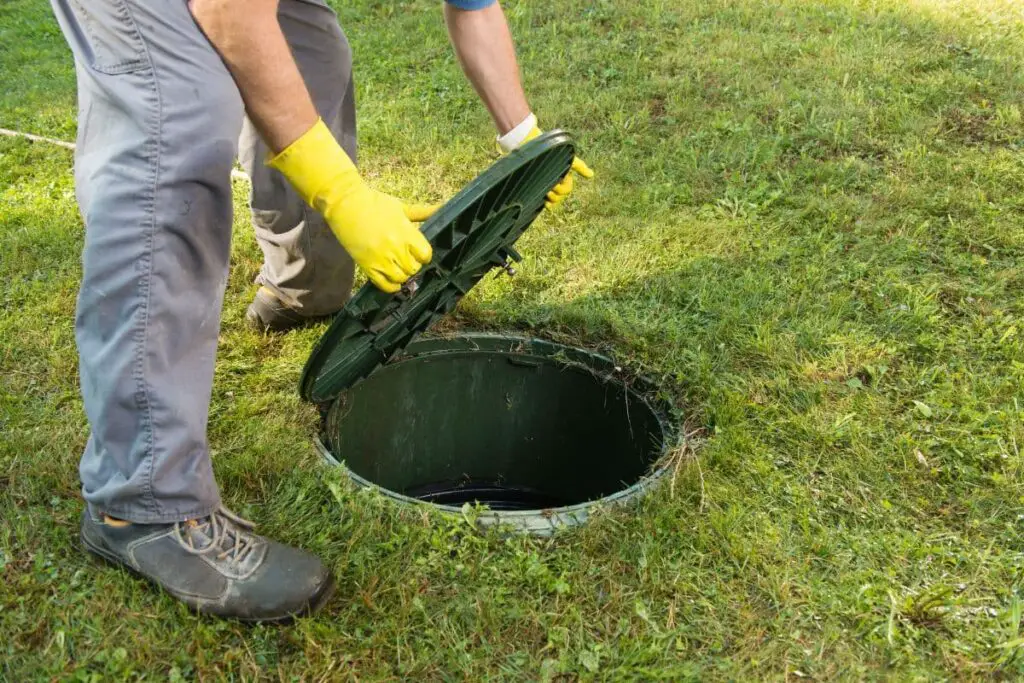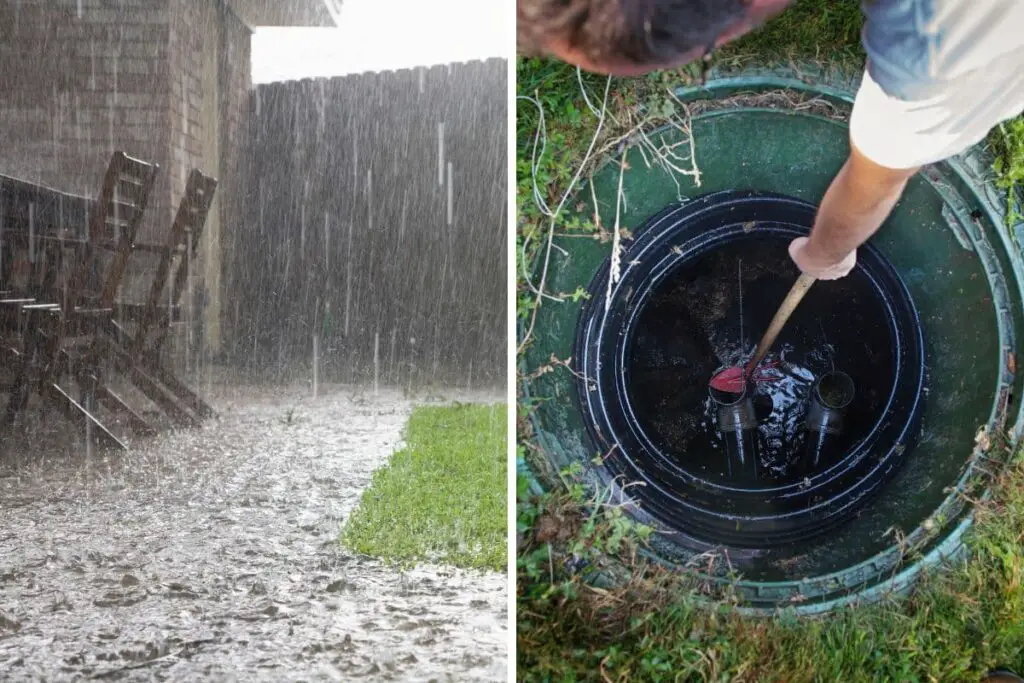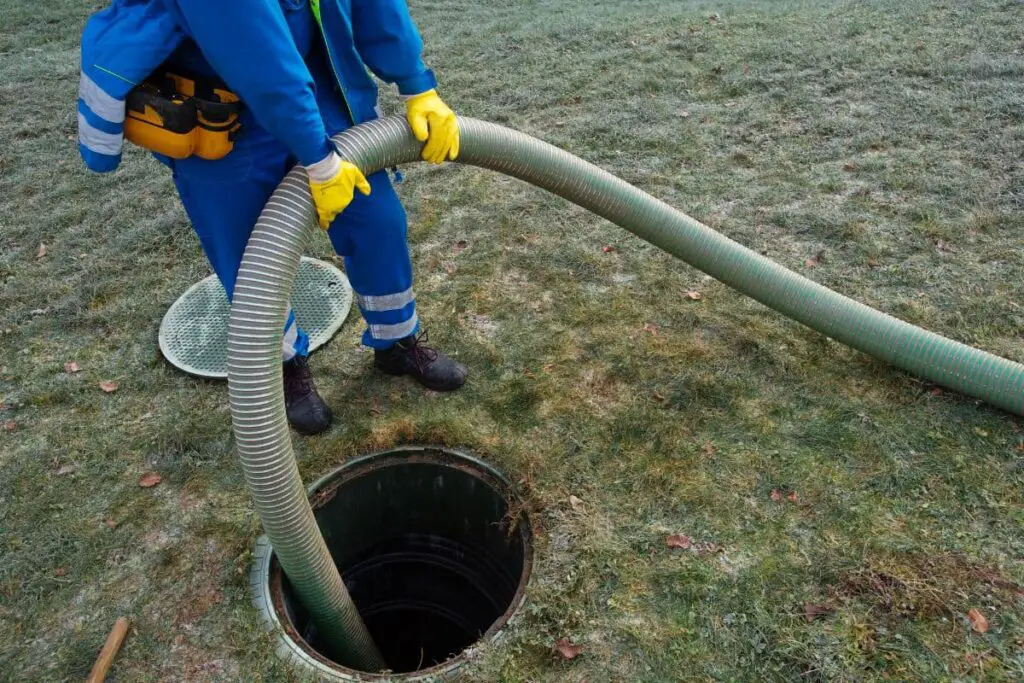As an Amazon Associate, we earn from qualifying purchases. We may also earn commissions if you purchase products from other retailers after clicking on a link from our site.
The Environmental Protection Agency (EPA) notes that approximately 20% of American households use decentralized or individual septic systems. However, this data is somewhat outdated because there’s no census information after 1990 related to septic tanks. Anyone with such a system might worry about the possibility of heavy rain causing a septic backup.
Heavy rain can cause septic backup if the precipitation is enough to saturate the system’s drain field. Also, a malfunctioning septic system is more vulnerable than a well-maintained tank with an efficient leach field.
Aside from septic backup, heavy rain may also cause partially treated sewage and wastewater to contaminate the surroundings, including above-ground installations. Read on to know how and why heavy rain can cause a septic backup.

How Heavy Rain Affects Septic Systems
Heavy rain triggers a process that will inevitably disrupt the normal functioning of a septic system. Also, the septic system users (i.e., the members of the household) can inadvertently aggravate the negative effects of heavy rain.
You need to understand how heavy rain affects septic systems, as it’ll help you recognize potential problems and plan proactive measures to prevent a backup and its related issues.
Heavy Rain Can Saturate the Drain Field Soil
Decentralized or individual septic systems have a drain field. This drain or leach field is the ground or soil that will get wet in the rain. Heavy rain brings enough precipitation to increase the water content in the ground, leading to saturated soil.
A Saturated Drain or Leach Field Gets Clogged
Saturated soil can no longer serve as the drain field for a septic system. The perforated pipes of the septic system won’t drain the partially treated wastewater or effluent until the ground or soil dries. Effectively, the drain or leach field is clogged and can’t serve its purpose.
A Blocked Outlet Overloads the Septic System
Because the perforated pipes are already loaded with partially treated wastewater from the septic tank, they won’t let any more outflow. While these perforated pipes are sloped under the ground, heavy rain saturating the soil will push back the wastewater inside the septic system.
As a result, the outlet tee inside the septic tank will no longer allow wastewater or effluent to flow into the perforated pipes and out to the drain field.
Heavy Rain May Directly Flood the Septic Tank
While the saturated ground or soil will effectively cause a blocked outlet tee, heavy rain might also directly flood the septic tank and worsen the issue. A septic tank’s access holes or inspection openings aren’t necessarily airtight or leakproof.
Heavy rain can cause water to pool on and around the access holes and inspection openings. If water flows into the septic tank, it’s only a matter of time before a heavy downpour floods the underground chambers. Note that the saturated drain field has likely blocked the septic tank outlet already.
Heavy Rain Is Likely To Cause Septic Backup
Heavy rain is likely to cause septic backup due to one or a combination of these reasons:
- Saturated drain or leach field
- Perforated pipes not draining
- Blocked septic tank outlet tee
- Potential flooding of the tank
This can worsen further due to:
- A small septic tank for a few users that isn’t designed for a lot of effluent or waste
- An unmaintained septic tank overloaded with scum, sludge, and wastewater
- Continuous supply of sewage and wastewater to the septic tank during a heavy rain
- Dirty drainage, plumbing, and septic system making the latter more vulnerable to a backup
How To Prevent Heavy Rain From Causing Septic Backup
Considering that heavy rain (a natural occurrence) can cause a septic backup, you might think there’s nothing you can do about the problem. The reality is that you can prevent heavy rain from causing septic backup.

Here are a few steps you should consider, depending on your septic system:
Always Prepare Whenever There’s a Heavy Rain Forecast
Ideally, you should reduce the volume of sewage and wastewater in your house whenever you expect heavy rain. If possible, postpone the laundry for later and opt for shorter showers.
If you live in one of the wettest regions in the U.S., check the capacity of your septic tank to figure out whether you require a new system. This is particularly important for anyone who has added new bathrooms to their house or has recently added new members to the family.
Also, avoid overloading a septic system that’s already stressed during heavy rain. Try to generate as little wastewater as possible, including all drainage from kitchen sinks and washbasins. Consider high-efficiency, dual-flush toilets if you live in a flood-prone area.
Empty the Septic Tank When Necessary
You must inspect the septic tank and empty it whenever necessary. A professional inspection every three years or so is a good idea. Standard septic tanks might have to be pumped once every three to five years, though the actual time may vary based on septic tank size and usage.
The EPA outlines the following indicators that homeowners should pump their septic systems:
- When the bottom of a septic tank’s scum layer is within six inches (approximately 15 cm) of the outlet’s bottom
- When the top of a septic tank’s sludge layer is within 12 inches (approximately 30 cm) of the outlet tee
- When an inspector or other service provider instructs you to pump the tank
Protect the Drain or Leach Field of Your Septic System
The drain or leach field should allow the perforated pipes to discharge the effluent. Also, the soil or ground should facilitate the optimum functioning of the system. For example, soil compaction or trees with deep roots may interfere with your septic tank’s ability to drain properly.

Try To Maintain the Microbiome Inside the Septic Tank
This is likely the most difficult for non-professionals to do. A septic tank has an ecosystem where anaerobic bacteria thrive. These microbes break down sewage to create the digestate that gets discharged with the effluent through the outlet tee.
Anything that can reduce these anaerobic bacteria’s populations will alter the septic tank’s microbiome, making the system less efficient at partially processing and disposing waste.
Various chemicals and organic waste can harm a tank’s microbiome, including:
- Chemicals such as drain and household cleaners, paints, etc.
- Coffee grounds, food wastes through garbage disposals
- Grease from butter, cheese, fats, heavy cream, oils, wax, etc.
Conclusion
Heavy rain will inevitably cause a septic backup, but you can reduce its impact via the tips I’ve shared above. Also, schedule timely inspections of your septic tank and the entire system if any part appears to be failing, and pump the tank periodically.
